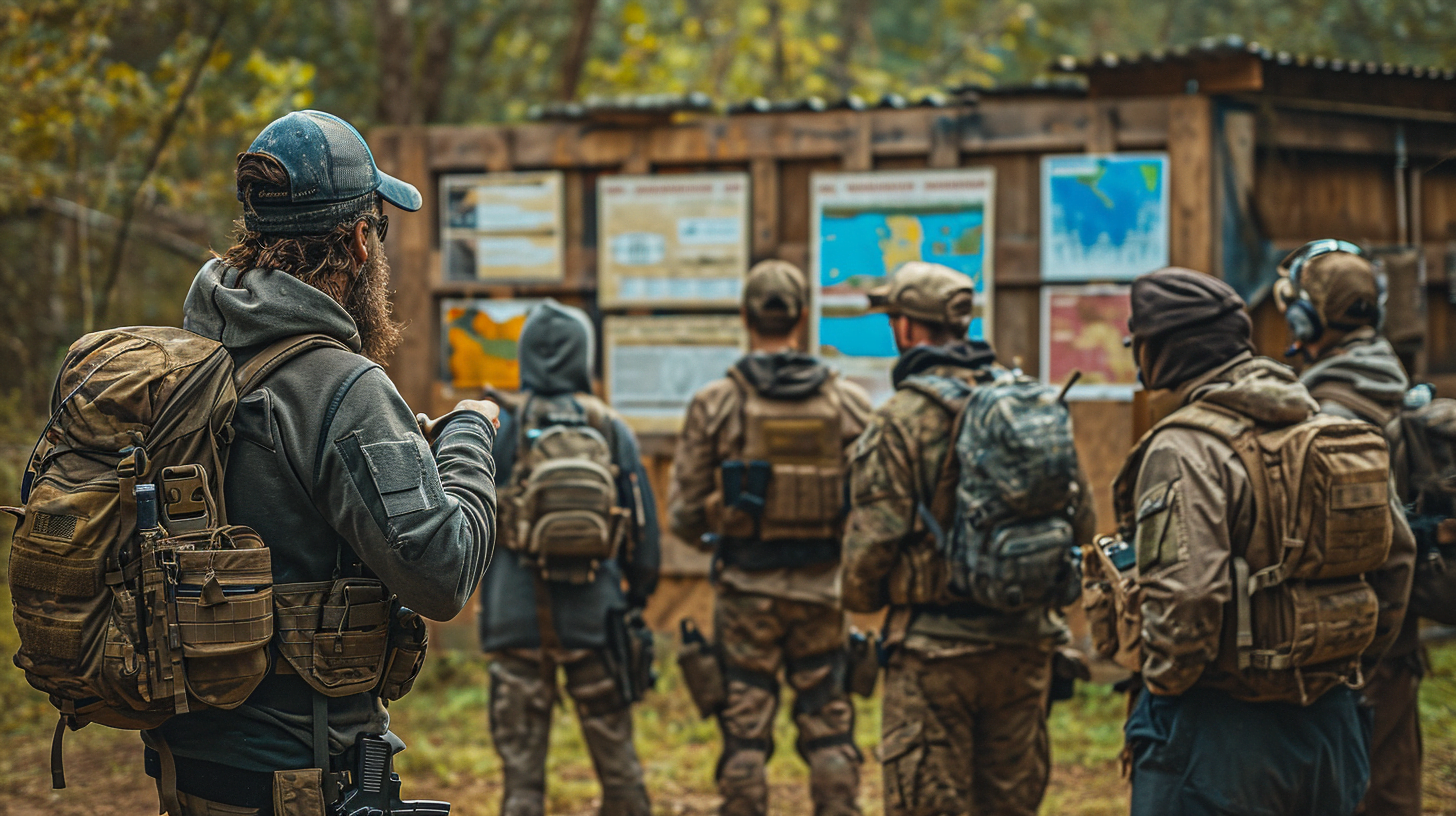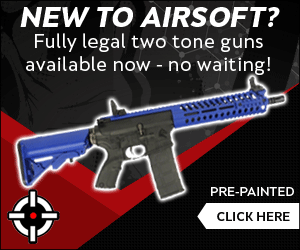Confused about airsoft gun laws in the UK? Many airsoft fans struggle to grasp the legal ins and outs of owning and using these replica firearms. The Violent Crime Reduction Act 2006 is the key legislation governing airsoft guns in the UK.
This guide breaks down UK airsoft laws into simple terms. We’ll cover age limits, ownership requirements, and transport rules. You’ll learn about power limits and modifications. By the end, you’ll have a clear picture of your rights and responsibilities as an airsoft gun owner in the UK.
Ready to become a law savvy airsoft player?
Overview of Airsoft Gun Legislation in the UK
UK airsoft gun legislation centres on the Violent Crime Reduction Act 2006 (VCRA). This law classifies airsoft guns as Realistic Imitation Firearms (RIFs) or Imitation Firearms (IFs).
The VCRA prohibits manufacturing, importing, or selling RIFs without valid defence.
UKARA membership often serves as this defence for RIF ownership. Airsoft guns must meet specific power limits and design criteria. Transport rules apply, requiring secure storage during transit.
Age restrictions exist for purchase and use. Modifications face strict regulations to prevent conversion to live-fire weapons.
Essential Legal Guidelines for Airsoft Gun Ownership
Airsoft gun ownership in the UK requires adherence to specific legal guidelines. Here are the essential rules for airsoft enthusiasts:
- Colour requirements: Airsoft guns must be brightly coloured, with at least 51% of the gun in a vivid tone.
- Valid defence: Owners need a valid reason for possession, such as membership in an approved airsoft organisation.
- Age restrictions: It’s illegal to sell airsoft guns to anyone under 18 or without a valid defence.
- Criminal record checks: Those convicted of certain crimes may be prohibited from owning airsoft guns.
- Mental health considerations: Individuals with specific mental health issues cannot possess airsoft weapons.
- Licensing exemption: Airsoft guns don’t require a licence, but proof of valid reason (e.g., UKARA membership) is needed for purchase.
- Power limits: Airsoft guns must adhere to specific muzzle energy limits set by UK law.
- Transport regulations: Airsoft guns must be securely stored and transported in a way that prevents public access.
- Modification restrictions: Certain modifications to airsoft guns may be illegal under UK firearms laws.
- Site usage: Airsoft guns can only be used at approved skirmish sites or private property with owner’s permission.
Age Limits for Airsoft Gun Acquisition
UK law sets clear age limits for airsoft gun ownership. Adults aged 18 and over can purchase airsoft guns legally. Under-18s can’t buy these replicas but may use them on private property if gifted by a parent or guardian.
Younger players often take part in airsoft activities under adult supervision, ensuring safety and compliance with regulations.
Strict age restrictions aim to promote responsible use of airsoft equipment. The 18+ rule applies to all types of airsoft guns, including spring-powered, gas-operated, and electric models.
These guidelines help maintain safety standards within the UK airsoft community and prevent misuse of realistic-looking replicas.
Differentiating Various Types of Airsoft Guns
Airsoft guns come in various types, each with unique characteristics. UK regulations classify these guns based on power source and appearance.
| Type | Power Source | Features |
|---|---|---|
| Electric Airsoft Guns (AEGs) | Battery-powered | High rate of fire, rechargeable |
| Gas-powered Airsoft Guns | Green gas or CO2 | Realistic blowback action, weather-sensitive |
| Spring-powered Airsoft Guns | Manual cocking | Low maintenance, quiet operation |
| Imitation Firearms (IFs) | Varies | Bright colour markings (red/blue), resemble real firearms |
AEGs dominate the market due to their versatility. Gas-powered guns offer realism but perform poorly in cold weather. Spring-powered models, often used in sniper rifles, require manual reloading after each shot. IFs need distinct markings to comply with UK law.
Guidelines for Buying and Selling Airsoft Guns
Buying and selling airsoft guns in the UK requires adherence to specific regulations. Here are key guidelines to follow:
- Valid defence requirement: Purchase Realistic Imitation Firearms (RIFs) only with a legitimate defence, such as UKARA membership.
- Two-tone option: Those without valid defence can buy brightly coloured “two-tone” guns from UK airsoft retailers.
- Age restrictions: You must be 18 or older to buy, sell, or own an airsoft gun in the UK.
- Retailer verification: Sellers must check buyer’s age and defence status before completing a sale.
- Power limits: Airsoft guns must not exceed 1.3 joules for fully automatic weapons or 2.5 joules for single-shot models.
- Transport rules: Carry airsoft guns in secure, non-transparent containers when in public spaces.
- Modifications: Altering airsoft guns to increase power or convert to live-fire is strictly prohibited.
- Sale restrictions: It’s illegal to sell or gift airsoft guns to anyone barred from firearm possession.
- Online sales: Verify buyer’s defence and age before shipping; include orange tip for RIFs.
- Import regulations: Follow UK customs rules when importing airsoft guns from abroad.
- Skirmish site purchases: Many fields offer on-site sales with proper defence checks.
- Second-hand sales: Ensure all transactions comply with UK airsoft laws and regulations.
Deeper Insights into Airsoft Gun Laws
Airsoft gun laws in the UK go beyond basic ownership rules. They cover transport, power limits, and game participation… Want to know more? Keep reading for the full scoop on UK airsoft regulations.
Transport Rules for Airsoft Guns
Transporting airsoft guns in the UK requires strict adherence to safety and legal guidelines. Here’s what you need to know:
- Secure storage is crucial. Airsoft guns must be kept in a locked case or bag, out of sight and reach.
- Purpose-designed bags or cases prevent theft and mistaken identity. These containers should be sturdy and opaque.
- Public transport is off-limits. It’s illegal to carry airsoft guns openly in public places without a valid reason.
- Vehicle storage matters. Keep airsoft guns in the boot or glove compartment, away from the driver and passengers.
- Documentation is key. Carry proof of airsoft gun ownership and, if applicable, site membership cards.
- Power limits apply. Ensure your airsoft gun complies with UK legal limits before transport.
- Disassembly may be necessary. Consider breaking down your airsoft gun for added safety during transport.
- Ammunition should be separate. Store BBs and gas canisters away from the airsoft gun itself.
- Be discreet. Avoid drawing attention to your airsoft gear during transport.
- Know local laws. Familiarise yourself with specific regulations in your area regarding airsoft gun transport.
Restrictions on Modifications and Power Limits
UK airsoft laws strictly regulate gun modifications and power limits. These rules aim to ensure safety and fair play in the sport.
- Power limits: Automatic airsoft guns must not exceed 1.3 joules. Single-shot weapons are capped at 2.5 joules.
- Northern Ireland exception: All airsoft guns in Northern Ireland are limited to 1 joule maximum power.
- Measurement standards: Power is measured in joules, not fps (feet per second).
- Modification restrictions: Altering airsoft guns to exceed legal power limits is prohibited.
- Velocity checks: Many airsoft sites conduct mandatory chronograph tests to verify gun power.
- Fps conversion: 1 joule roughly equals 328 fps for a 0.20g BB.
- Two-tone requirement: Realistic imitation firearms (RIFs) must be at least 51% brightly coloured.
- UKARA registration: Players need UKARA membership to buy non-two-tone airsoft guns.
- Barrel length rules: Airsoft guns must have a minimum barrel length of 30cm.
- Overall length: The total length of an airsoft gun must be at least 60cm.
Participating in Airsoft Activities in the UK
Airsoft enthusiasts in the UK must adhere to strict regulations. Legal airsoft activities take place exclusively at licensed sites with proper insurance. These venues offer diverse game scenarios, from military simulations to casual skirmishes.
Players aged 12 and above can participate, with appropriate supervision for younger participants. Safety gear, including eye protection, is mandatory. UK law restricts airsoft gun power limits and modifications to ensure player safety.
Transport rules require airsoft guns to be securely stored and concealed during transit to and from game sites.
Role of Airsoft Organisations and Community in the UK
Organisations like the National Airsoft Association (NAA) and United Kingdom Airsoft Retailers Association (UKARA) play crucial roles in the UK airsoft community. The NAA champions safe play and represents players nationwide, fostering a responsible gaming environment.
UKARA, on the other hand, verifies genuine players and prevents misuse of Realistic Imitation Firearms (RIFs), ensuring compliance with UK laws.
These groups form the backbone of the airsoft community, organising events, setting standards, and liaising with authorities. They provide essential services such as player registration, site accreditation, and education on legal requirements.
Their efforts have helped establish airsoft as a legitimate sport in the UK, creating a thriving community of enthusiasts who enjoy the game while adhering to safety and legal guidelines.
Common Questions About Airsoft Guns
Airsoft enthusiasts often have queries about the legal aspects of their hobby. Here are some common questions about airsoft guns in the UK:
- Can I buy an airsoft gun without a defence? No, you need a valid defence like UKARA membership to purchase Realistic Imitation Firearms (RIFs).
- What’s the legal age to own an airsoft gun? You must be 18 or older to buy, own, or use an airsoft gun in the UK.
- Are there power limits for airsoft guns? Yes, automatic weapons must not exceed 1.3 joules, while single-shot weapons are limited to 2.5 joules.
- Can I use my airsoft gun in public? No, it’s illegal to display, brandish, or use airsoft guns in public areas in the UK.
- Do I need a firearms certificate for an airsoft gun? Generally, no. Most airsoft guns are exempt from firearm certification under the Firearms Act 1968.
- Where can I legally use my airsoft gun? Only on private property with the owner’s permission or at regulated airsoft sites.
- Can I modify my airsoft gun? Modifications are allowed, but the gun must stay within legal power limits.
- Are there restrictions on transporting airsoft guns? Yes, they must be securely stored and not visible during transport.
- Can I sell my airsoft gun to anyone? No, you can only sell to individuals with a valid defence or through a registered retailer.
- Are there specific rules for airsoft pistols? The same laws apply to all airsoft guns, regardless of type.
- Can airsoft guns be used for real military training? Yes, we supply airsoft realistic firearm replicas for Military & PMC Training
Conclusion
UK airsoft laws demand careful attention. Players must grasp age limits, gun types, and power restrictions. UKARA membership proves crucial for purchasing realistic replicas. Safe transport and responsible use are non-negotiable.
Embrace the sport’s community while respecting its legal framework for a rewarding experience.










